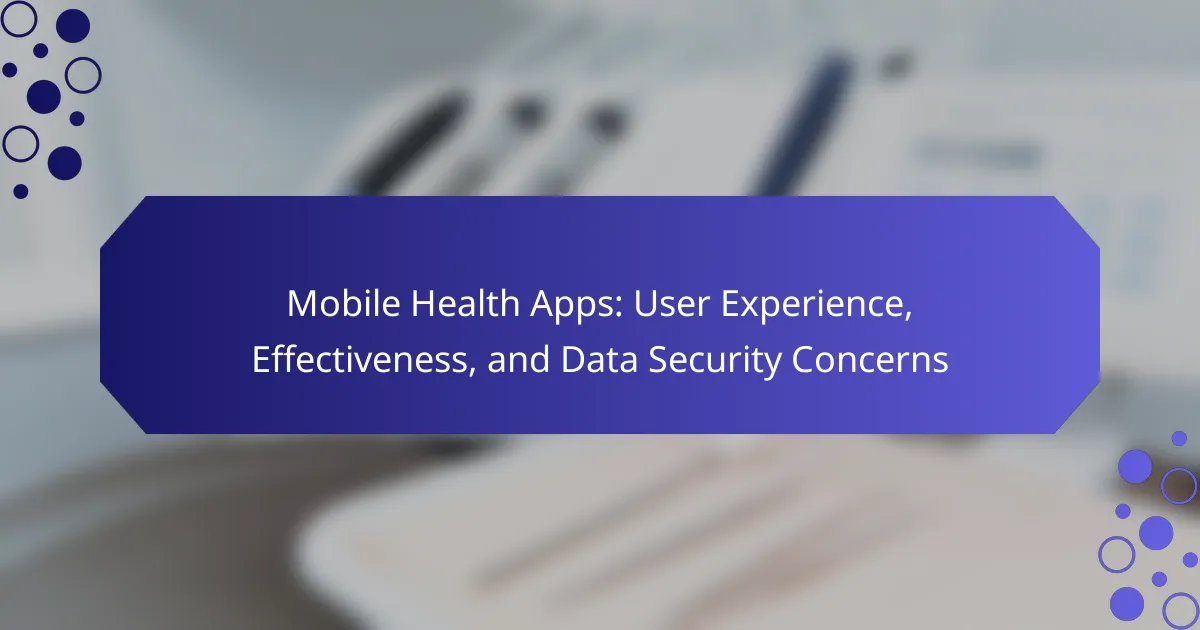Mobile health apps enhance health management, but they also raise concerns about user experience and data security. This article explores usability factors that influence adoption, examines the effectiveness of these apps in managing chronic conditions, and addresses critical data security issues. By understanding these aspects, users can make informed decisions about their mobile health app choices.
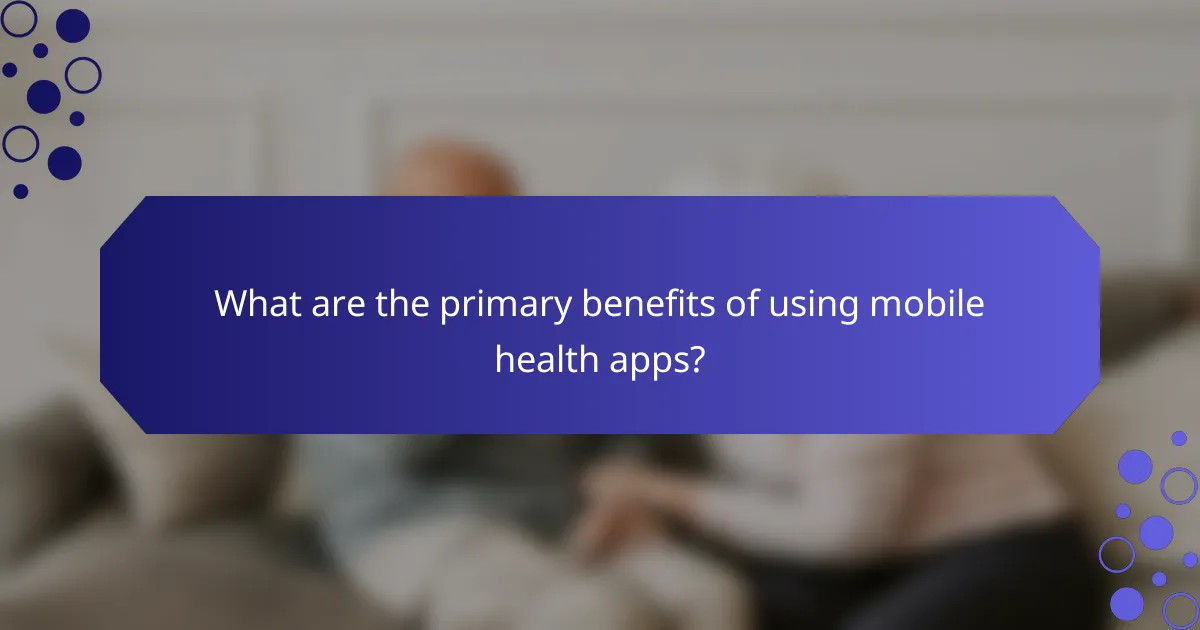
What are the primary benefits of using mobile health apps?
Mobile health apps offer numerous benefits, including improved health management, enhanced accessibility, and personalized user experiences. These applications empower users to track their health metrics conveniently, leading to better engagement in their wellness journey. Data security remains a critical concern, with many apps implementing robust measures to protect sensitive information. Furthermore, mobile health apps can facilitate communication between patients and healthcare providers, fostering a collaborative approach to healthcare.
How do mobile health apps enhance patient engagement?
Mobile health apps significantly enhance patient engagement by providing personalized health tracking, education, and communication tools. These apps facilitate real-time feedback, empowering patients to take an active role in their health management. Features such as reminders for medication and appointments improve adherence and accountability. As a result, patients are more likely to engage with their healthcare providers and follow treatment plans effectively.
Which health outcomes can be improved through mobile health app usage?
Mobile health app usage can improve various health outcomes, including chronic disease management, mental health support, and lifestyle changes. These apps enhance user engagement, track health metrics, and provide personalized feedback. For instance, studies show that users of diabetes management apps can achieve better glycemic control and adherence to treatment plans. Additionally, mental health apps can reduce symptoms of anxiety and depression through guided interventions. Overall, mobile health apps empower users to take charge of their health and improve their quality of life.
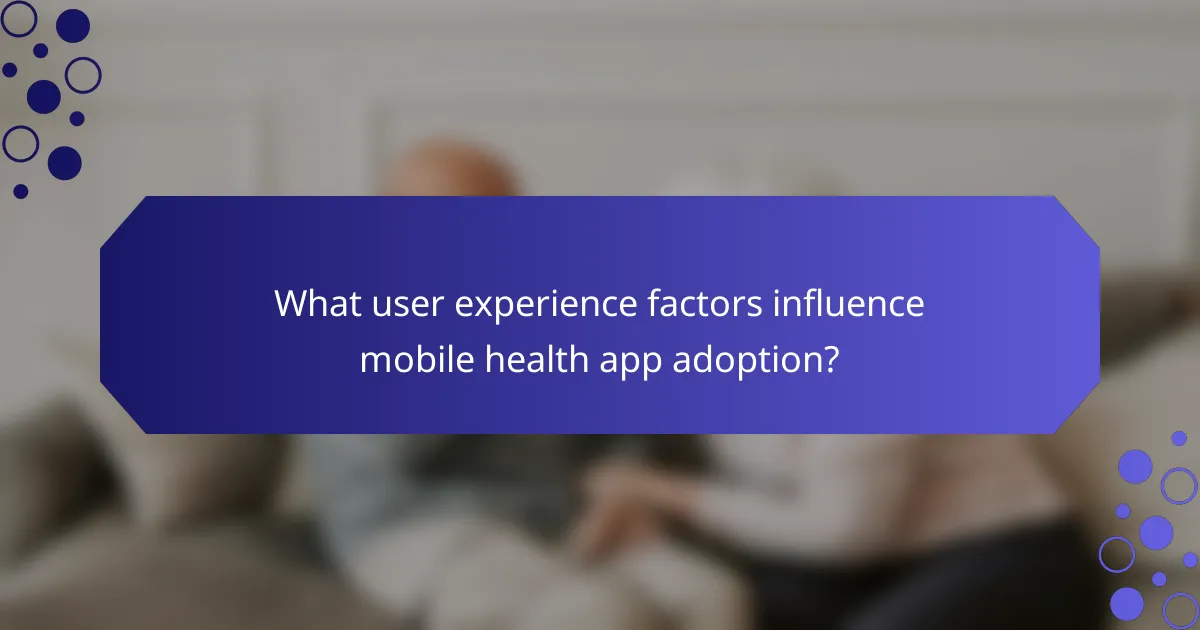
What user experience factors influence mobile health app adoption?
User experience factors that influence mobile health app adoption include usability, design, and personalization. A smooth user interface enhances engagement, while appealing aesthetics attract users. Personalization features, such as tailored health recommendations, improve relevance and user satisfaction. Additionally, trust in data security significantly impacts user willingness to adopt these apps.
How does app design impact user satisfaction?
App design significantly impacts user satisfaction by enhancing usability, engagement, and trust. A well-designed mobile health app improves navigation and accessibility, leading to a positive user experience. Effective design incorporates user feedback and testing, ensuring the app meets user needs and preferences. Data security features also play a crucial role, as users prioritize the protection of their health information. Engaging interfaces and intuitive layouts can increase user retention and satisfaction, ultimately influencing the app’s effectiveness in promoting health and wellness.
What role does user feedback play in app development?
User feedback is vital in app development as it shapes user experience and enhances effectiveness. It allows developers to identify usability issues and prioritize features based on user needs. Regular feedback collection leads to continuous improvement, fostering user satisfaction and retention. Moreover, addressing security concerns through user insights builds trust, crucial for mobile health apps. This iterative process ensures that the app evolves to meet changing user expectations and industry standards.
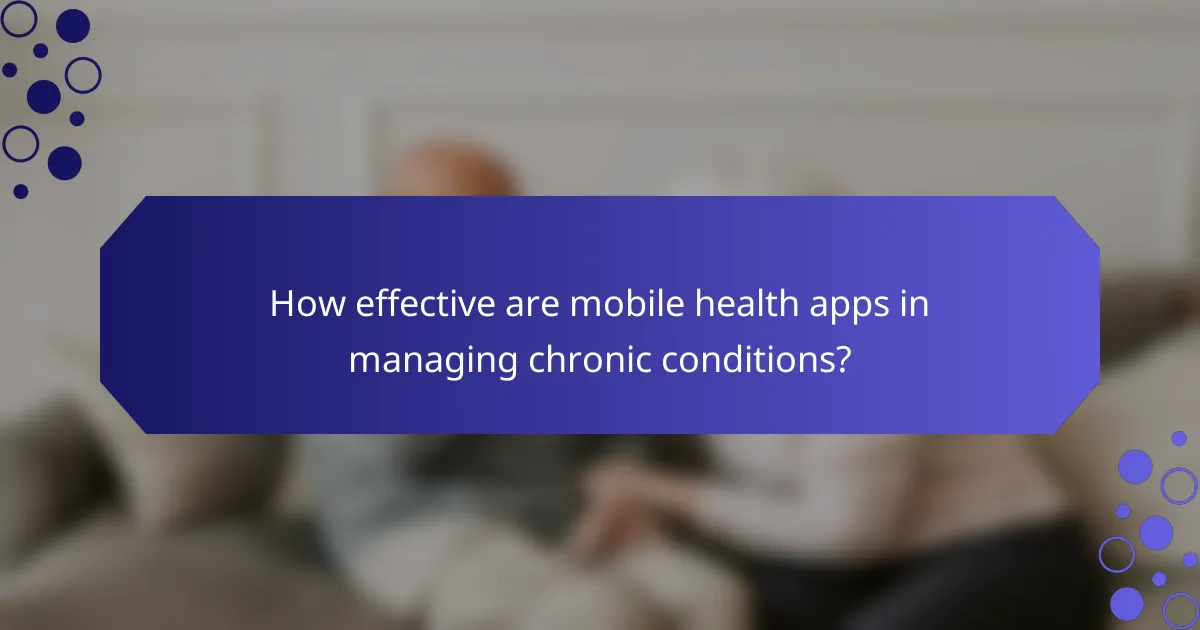
How effective are mobile health apps in managing chronic conditions?
Mobile health apps are effective tools for managing chronic conditions, with studies showing improved patient outcomes. These apps enhance self-management, provide timely reminders, and facilitate communication with healthcare providers. For instance, a study indicated that diabetes management apps can lower HbA1c levels by an average of 0.5%. User engagement is crucial; apps that incorporate gamification and personalized feedback tend to have higher adherence rates. However, data security remains a concern, as many users are wary of sharing sensitive health information. Ensuring robust encryption and compliance with regulations can enhance user trust and app effectiveness.
What metrics are used to measure effectiveness in mobile health apps?
Mobile health apps measure effectiveness using metrics like user engagement, health outcomes, and retention rates. Key performance indicators include the frequency of app usage, user satisfaction scores, and adherence to prescribed health plans. These metrics provide insights into how well the app supports users’ health goals.
Which specific chronic conditions benefit most from mobile health apps?
Mobile health apps significantly benefit chronic conditions such as diabetes, hypertension, asthma, and mental health disorders. These apps enhance self-management, provide real-time monitoring, and improve patient engagement. For instance, diabetes management apps can help users track blood sugar levels and medication adherence. Apps designed for hypertension can monitor blood pressure trends and offer lifestyle recommendations. Asthma management apps can provide inhaler reminders and track symptoms. Mental health apps often offer therapeutic exercises and mood tracking, fostering better emotional well-being. These targeted functionalities highlight the unique attributes of mobile health apps in managing specific chronic conditions.
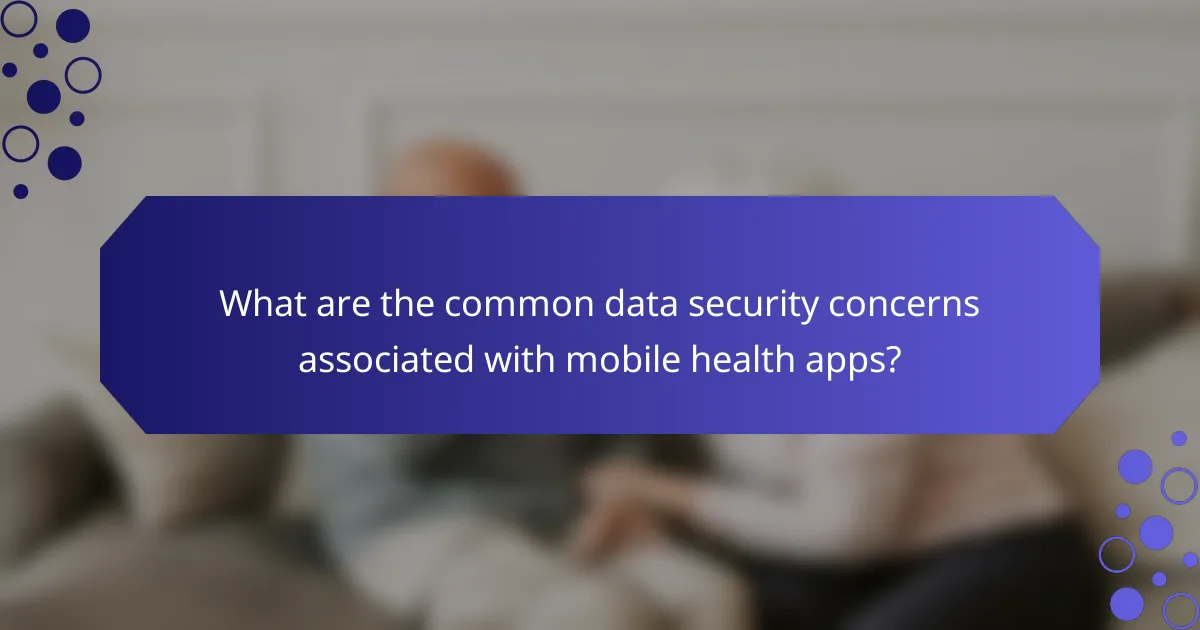
What are the common data security concerns associated with mobile health apps?
Mobile health apps face several common data security concerns. These include unauthorized access to personal health information, data breaches, and inadequate encryption methods. Users often worry about the potential for identity theft and misuse of sensitive data. Additionally, the lack of regulatory compliance can expose apps to vulnerabilities, increasing the risk of data loss. Regular updates and strong security protocols are essential for mitigating these risks.
How do privacy regulations affect mobile health app development?
Privacy regulations significantly influence mobile health app development by mandating stringent data protection measures. Compliance with laws like HIPAA in the U.S. ensures user data confidentiality and security. Developers must implement features such as encrypted data storage and user consent mechanisms. As a result, these regulations can enhance user trust and app credibility. However, the complexity of compliance may increase development costs and timelines, potentially limiting innovation in the sector.
What measures can users take to protect their data while using these apps?
Users can protect their data while using mobile health apps by following several key measures. First, enable two-factor authentication to add an extra layer of security. Second, regularly update the app to ensure it has the latest security patches. Third, review privacy settings to limit data sharing with third parties. Fourth, utilize strong, unique passwords for app accounts. Finally, avoid using public Wi-Fi when accessing sensitive health information, as it increases the risk of data breaches. These practices enhance user data security and mitigate risks associated with mobile health app usage.
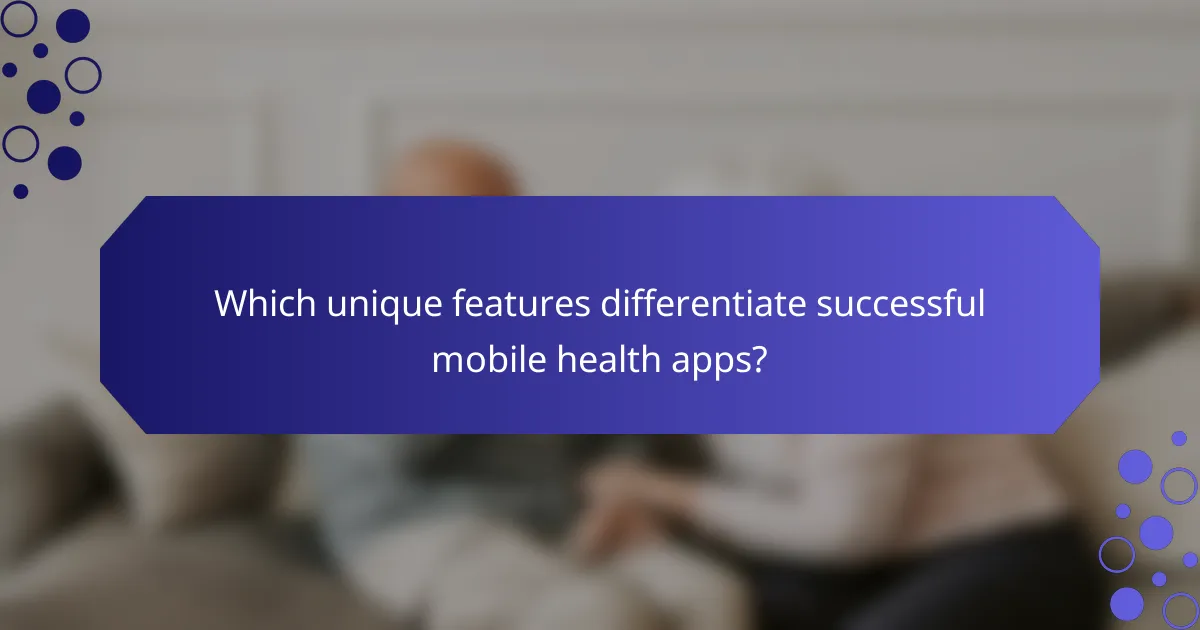
Which unique features differentiate successful mobile health apps?
Successful mobile health apps often feature personalized user experiences, robust data security measures, and evidence-based effectiveness. These attributes create a distinct advantage in user engagement and trust. Personalization enhances user motivation by tailoring content to individual needs, while strong data security builds confidence in handling sensitive health information. Additionally, apps that demonstrate measurable health outcomes are more likely to retain users and gain credibility in the market.
How do integration capabilities with wearable devices enhance app functionality?
Integration capabilities with wearable devices significantly enhance mobile health app functionality by enabling real-time data collection and personalized user experiences. These integrations allow apps to track metrics such as heart rate, sleep patterns, and physical activity seamlessly.
The data gathered improves user engagement by providing actionable insights tailored to individual health goals. For instance, apps can send reminders or suggestions based on real-time monitoring, fostering healthier habits.
Moreover, wearables enhance data security through encrypted connections, ensuring sensitive health information remains protected. Overall, the synergy between mobile health apps and wearable devices creates a more effective and secure health management ecosystem.
What innovative technologies are shaping the future of mobile health apps?
Innovative technologies shaping mobile health apps include artificial intelligence, telemedicine, wearable devices, and blockchain. These advancements enhance user experience, improve effectiveness, and address data security concerns. For example, AI algorithms analyze user data for personalized health insights. Wearable devices monitor vital signs in real-time, promoting proactive health management. Telemedicine enables remote consultations, increasing accessibility. Blockchain technology enhances data security through decentralized storage, ensuring patient privacy. These technologies collectively redefine mobile health app functionality and user engagement.
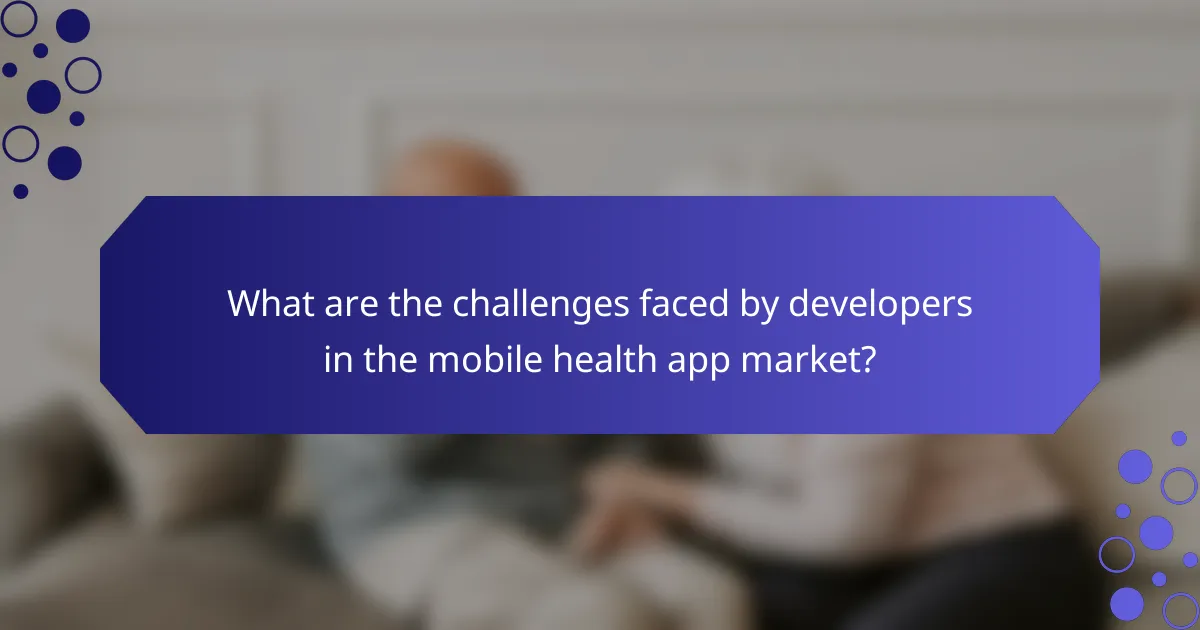
What are the challenges faced by developers in the mobile health app market?
Developers in the mobile health app market face significant challenges including user experience design, data security, and regulatory compliance. User experience is crucial as apps must be intuitive and engaging to retain users. Data security concerns arise from handling sensitive health information, necessitating robust encryption and privacy measures. Additionally, navigating complex regulations like HIPAA can complicate development processes. These factors collectively impact the effectiveness and adoption of mobile health apps.
How does the competitive landscape impact app innovation?
The competitive landscape drives app innovation by pushing developers to enhance user experience, effectiveness, and data security. As competition intensifies, companies prioritize features that meet user demands and regulatory standards. Improved user engagement often results from unique attributes, such as personalized experiences and streamlined interfaces. Additionally, effective apps integrate robust data security measures, responding to rare industry concerns about privacy and trust. This dynamic environment fosters continuous improvement and adaptation in mobile health apps.
What are the barriers to entry for new mobile health app developers?
New mobile health app developers face several barriers to entry, including regulatory compliance, funding challenges, and user trust issues. Regulatory requirements vary by region and can be complex, making it difficult to navigate. Securing funding is often challenging due to the competitive landscape and the need for robust business models. Additionally, building user trust is crucial, as data security and privacy concerns are paramount in the health sector.
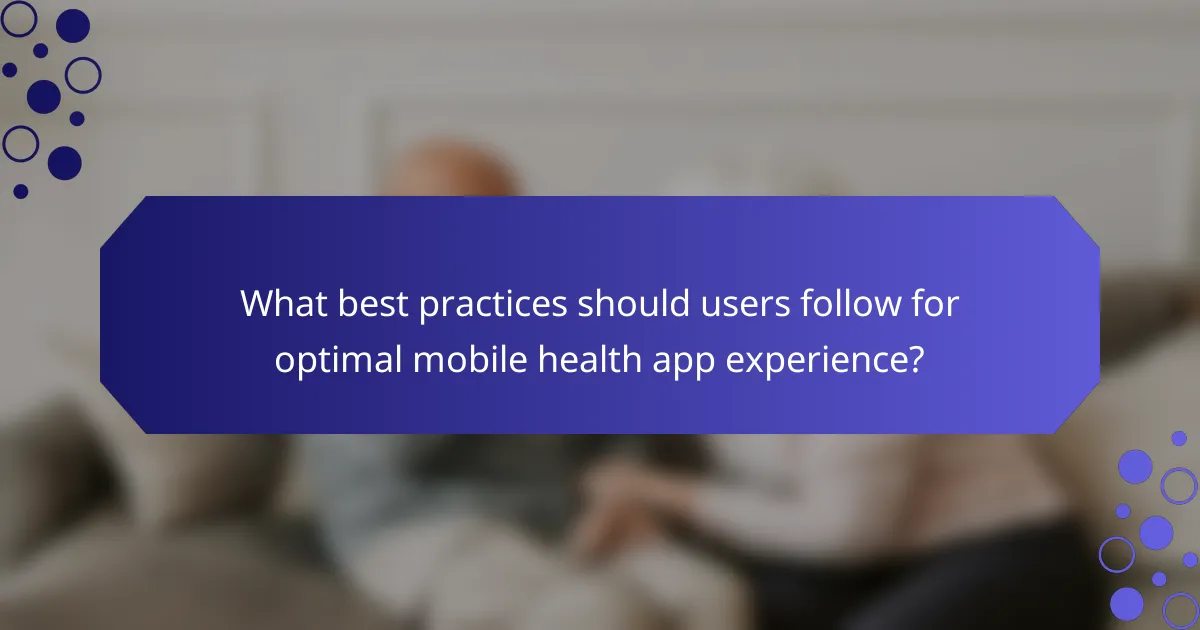
What best practices should users follow for optimal mobile health app experience?
To achieve an optimal mobile health app experience, users should prioritize usability, data security, and personalization. Focus on user-friendly interfaces, ensuring easy navigation and accessibility features. Regularly update the app to enhance functionality and security. Utilize strong passwords and enable two-factor authentication to protect personal health data. Lastly, tailor app settings to individual health needs for a more effective experience.
How can users effectively evaluate and choose the right mobile health app?
To effectively evaluate and choose the right mobile health app, users should consider several key factors. First, assess the app’s user experience, including interface design and ease of navigation. Next, examine its effectiveness by looking for evidence-based features and user reviews. Data security is crucial; ensure the app complies with regulations and protects personal health information. Finally, check for compatibility with devices and integration with other health services.
What common mistakes should users avoid when using mobile health apps?
Users should avoid common mistakes like neglecting data privacy settings, ignoring app permissions, and failing to keep the app updated. Additionally, not verifying the credibility of the app can lead to misinformation, while overlooking integration with health devices may limit effectiveness. Lastly, using multiple apps without a clear strategy can create confusion and reduce overall health management.
